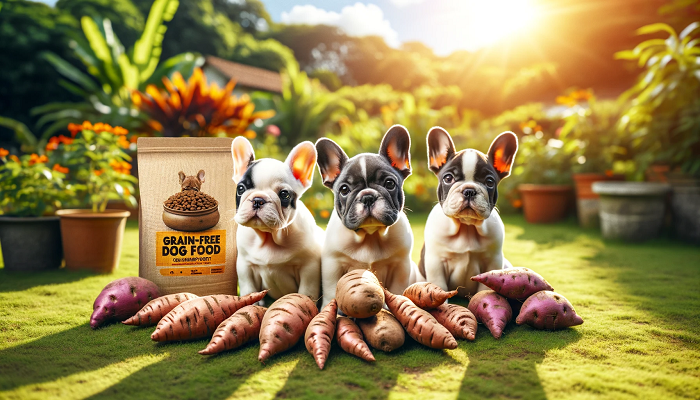Grain-Free Dog Food
Like humans, dogs may need to switch to grain free dog food if they have allergies or intolerances. Explore grain-free dog food and if it’s right for your Frenchie.
Home » Diet & Nutrition » Dog Food Hub »

Written By
Dan Harrison
Editor

Reviewed By
Ameilia Harrison
Nutrition

Reviewed By
Penny Worthington
Health
Page Last Updated: 3rd February 2024
On This Page
Quickly find and read what interests you the most using the links below:
Table of Contents
- What is grain-free dog food?
- Can French Bulldogs eat grains?
- Grain-free vs gluten-free
- Benefits of grain-free dog food
- Drawbacks of grain-free dog food
- Grain alternatives
- Is grain-free food good for puppies?
- Consider individual needs
- Processed grains in dog food
- Research on grain-free dog food and health
- Final thoughts
What is grain-free dog food?
Grain-free dog food recipes exclude grains like wheat, barley, oats, corn, or rice.
These grains are replaced with alternative ingredients that maintain the flavour and nutritional value of the meal while still providing necessary carbohydrates.
Quality grain-free dog food ensures your pet’s dietary needs are met by using alternative sources of carbohydrates like sweet potatoes, peas, and legumes, often enriching the food with higher protein content and essential nutrients.
Can French Bulldogs eat grains?
In most cases, dogs are well-equipped to eat and digest grains, which provide vital vitamins and carbohydrates for their health and energy.
However, some dogs may develop allergies to grains, leading to the existence of grain-free dog food.
If you suspect your French Bulldog has a grain allergy, consult your vet for guidance.
Grains are common in many dog foods, offering fibre, essential nutrients such as B vitamins, and important minerals.
However, symptoms like itching, digestive distress, or chronic ear infections in some French Bulldogs can indicate a grain allergy, making grain-free options a better choice.
Grain-free vs gluten-free
It’s essential not to confuse grain-free with gluten-free dog food.
Gluten-free dog food eliminates grains containing gluten, like wheat and barley, while other gluten-free grains, such as corn or rice, might still be included.
Grain-free food, on the other hand, removes all grains and uses alternative carbohydrate sources, which is beneficial for French Bulldogs with specific grain allergies or sensitivities.
Benefits of grain-free dog food
- Digestive health. Grain-free diets may help dogs with sensitive digestion or those prone to digestive issues by providing easier-to-digest carbohydrate sources.
- Allergy management. In rare cases, dogs can develop grain allergies. Grain-free dog food can alleviate symptoms, often improving skin and coat health and reducing gastrointestinal discomfort.
- High-quality ingredients. Many high-quality, grain-free foods are crafted with superior protein sources and natural ingredients, promoting overall health and well-being.
Drawbacks of grain-free dog food
While grain-free diets can be beneficial, choosing high-quality options is vital.
Low-quality grain-free food may lack essential nutrients, leading to nutritional imbalances.
Additionally, grain-free dog food can be more expensive than regular dog food, and some studies have raised concerns about potential links to heart disease, making it essential to choose a well-balanced diet.
Grain alternatives
Grain-free dog food uses alternatives to traditional grains to provide necessary carbohydrates and nutrients while catering to dogs with grain allergies or intolerances.
These alternatives are chosen for their ability to maintain the nutritional balance of the food.
Common alternatives and their nutritional benefits:
- Cassava. It is a root vegetable rich in carbohydrates and gluten-free, making it suitable for Frenchies with grain allergies. It’s typically used in combination with other ingredients for a balanced diet.
- Sweet potatoes. It is high in dietary fibre and rich in vitamins A, C, and B6 and potassium. Sweet potatoes have a lower glycemic index than white potatoes, which is beneficial for blood sugar regulation.
- Peas. It is a source of carbohydrates, protein, essential vitamins like K and B, and minerals such as magnesium and iron. Peas also contribute to the dietary fibre content, aiding in digestion.
Higher protein and fibre content
Many grain-free dog foods use these alternatives to enhance the food’s protein and fibre content. For example, peas contribute to protein content while providing necessary energy and nutrients.
Balancing the diet
High-quality grain-free dog foods are formulated to ensure that all necessary nutrients are present in appropriate amounts, possibly supplemented with additional vitamins or minerals to meet the dietary needs of dogs.
These grain alternatives are integral to providing a balanced and nutritious diet for dogs, especially those with specific dietary requirements or sensitivities.
Is grain-free food good for puppies?
Deciding whether grain-free food suits puppies requires understanding their nutritional needs during their crucial growth stages. High-quality, grain-free puppy food can be a viable option, but it’s essential to consider several factors.
Nutritional requirements of puppies
Puppies require a diet rich in protein (22-32%), higher calories, balanced calcium and phosphorus for bone growth, essential fatty acids like Omega-3 for brain development, and a range of vitamins and minerals for overall health.
They also need more water to stay hydrated.
Formulation for puppies
High-quality grain-free puppy foods are formulated to meet these increased nutritional demands.
They should be labelled as “complete and balanced” for puppies, meaning they meet the nutrient profiles recommended by UK Pet Food (Formerly the PFMA).
Look for grain-free puppy foods rich in high-quality, easily digestible protein sources.
Animal-based proteins are essential for their amino acid profile, which is crucial for puppy growth.
Grain-free and digestibility
Puppies have developing digestive systems. Grain-free foods often use alternative carbohydrate sources like sweet potatoes, which are generally easier to digest than some grains.
This can be beneficial for puppies with sensitive stomachs or grain allergies.
However, ensuring these alternatives do not compromise the nutritional balance is essential. The diet should still provide ample energy and nutrients for a growing puppy.
DHA and other nutrients
Certain nutrients are essential for puppies. For example, DHA (Docosahexaenoic Acid), an omega-3 fatty acid found in fish oil, is crucial for your puppy’s brain and eye development.
Ensure that the grain-free food includes this and other essential nutrients.
Transitioning to grain-free foods
Switching a puppy to grain-free food should be done gradually to avoid digestive upset.
Mix the new food with the current food and gradually increase the proportion of the new food over several days.
For more information on transitioning, visit our main Dog Food page.
Ensuring a grain-free diet is well-balanced and suitable for the specific needs of a growing puppy can be a suitable option for young dogs.
Consider individual needs
The choice between regular and grain-free dog food depends on various factors, including your dog’s health, activity levels, allergies, and age.
Consulting your vet and paying attention to your dog’s reactions can help you make the best decision.
Some dogs thrive on grain-inclusive diets, while others may require grain-free options for optimal health.
Processed grains in dog food
Processed grains may appear in ingredient lists such as wheat gluten, corn gluten meal, wheat middlings, cereal fines, or grain hulls.
These ingredients are often fillers or protein sources but may not provide the same nutritional value as whole grains or high-quality grain-free alternatives.
Research on grain-free dog food and health
Some studies suggest a link between grain-free and legume-rich diets and heart disease, specifically taurine-deficient dilated cardiomyopathy (DCM). However, research is ongoing to understand the connection entirely.
Final thoughts
For French Bulldogs with grain allergies or sensitivities, grain-free dog food is often the best choice.
Consulting your vet ensures it’s the right fit. Tailoring their diet is crucial to their long-term health and happiness.
About Frenchies
Breeding Guide
Buying Guide
Training Guide
Puppies
Appearance
Albino (Pink)
Black and Tan
Blue
Brindle
Chocolate
DNA Charts
Fawn
Fluffy
Hairless
Isabella
Lilac
Merle
Pied
Platinum
Sable
Teacup
Diet & Nutrition
Dog Food
Dry Dog Food
Fresh Dog Food
Gastrointestinal Dog Food
Grain-Free Dog Food
Hypoallergenic Dog Food
Low-Fat Dog Food
Organic Dog Food
Raw Dog Food
Wet Dog Food
Recipes
Dog Treats
Vitamins and Supplements
Grooming
Health & Wellbeing
Allergies
Anxiety
BOAS
Breathing
Butt
Cleft Palate
Coughing
Dental
Diabetes
Drooling
Ears
Exercise
Eyes
Fleas
Insurance
IVDD
Later Life
Neck
Neutering & Spaying
Nose
Over Heating
Paws
Pregnancy, Periods & Heat
Seizures
Shaking
Skin & Coat
Sleep
Spine & Legs
Stenotic Snares
Stomach
Tail

Terms of Use
Privacy Policy
GDPR Policy
Transparency Policy

